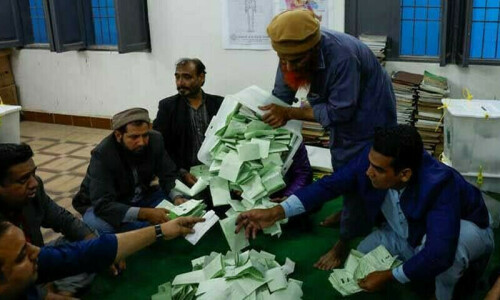KARACHI: Although Pakistan has not reported any case of bird flu yet despite facing serious threat from regional countries, it is time that the provincial governments, particularly that of Sindh and Balochistan, help poultry farmers, improve disease surveillance, allocate budget for research and formulate the much-awaited bylaws for the poultry sector.
These views were shared by poultry farmers and experts Dawn spoke to over the looming threat of bird flu that has affected neighbouring countries, including India and Iran, where recently 1.4 million poultry birds were culled to contain the spread of severe bird flu, known as H5N8.
“The bird flu threat is serious though we haven’t received any report of a case yet. The only way we can minimise the risk is by strengthening coordination with farmers, upgrading surveillance and testing capacity and improving provincial coordination with the National Reference Laboratory for Poultry Diseases located in Islamabad,” said a lab official on the condition of anonymity.
‘The government, if serious, should set up poultry disease diagnostic laboratories in each district’
The laboratory, part of the National Agricultural Research Centre, was well equipped to carry out any kind of poultry disease tests, he added.
Asked about the effectiveness of provincial coordination, he conceded that it was more effective before the enactment of the 18th Constitutional Amendment.
‘No govt facilitation’
Speaking to Dawn, commercial poultry farmers based in different districts of Sindh stated that the government’s role nowhere existed in poultry production as they took care of all their inputs and no government official ever inspected their premises for disease surveillance and support.
“I have been in this business for a long time and never heard of free vaccines or disease surveillance by any government department,” said Haji Idrees, running controlled shed poultry farming in Dadu, adding that he knew well how to take care of poultry birds when they catch the infection.
Expressing similar views, Sarfaraz Junejo running a business in Mirpurkhas, said while he heard of a poultry research institute in Korangi, Karachi, he never sought its help and always relied on private labs and vets.
“That’s because we need immediate action and support. The government, if serious, should set up poultry disease diagnostic laboratories in each district,” he said, adding that one could imagine what would be the state in other districts located far away from Karachi.
Mr Junejo also once thought of exporting poultry to the UAE but couldn’t do so.
“I came to know that exporters needed to have certain certifications to get into this business, which don’t exist here.”
Replying to the concerns raised by farmers, Dr Rashid Farooq, the focal person for poultry diseases in Sindh, said the main focus of the government was prevention and that vaccines, medicines and diagnostic support were provided free only to those small/backyard poultry farmers who raised 5,000 to 6,000 birds.
“Currently, poultry disease diagnostic labs are functional in Sukkur, Hyderabad and Karachi. Tests are carried out either when we receive a poultry sample from a farmer or our team collects it during inspection in a market,” he said.
Asked whether government officials had the authority to inspect a private farm, he replied in the negative.
“Right now, disease surveillance is solely dependent on farmers’ cooperation as officials have no lawful authority to inspect any private premises. This power will come through bylaws preparation which is in process right now.”
He, however, emphasised that farmers were very sensitive about any loss they might suffer due to the disease and inform the government and seek its support if a need arose.
According to sources, financial constraints are a major factor hampering disease surveillance efforts as there is no budget allocation for research. Besides, the departmental staff hardly received funds for important operational expenditures without which it’s not possible to carry out disease surveillance.
Published in Dawn, March 2nd, 2021















































